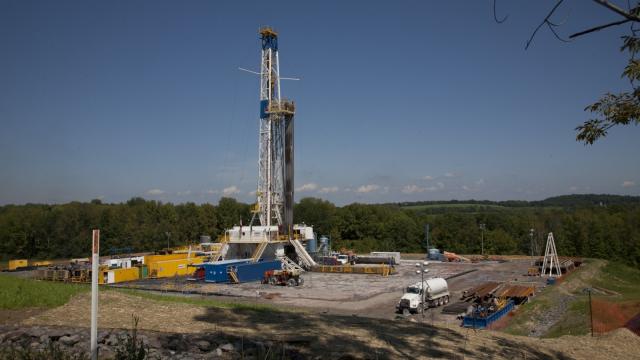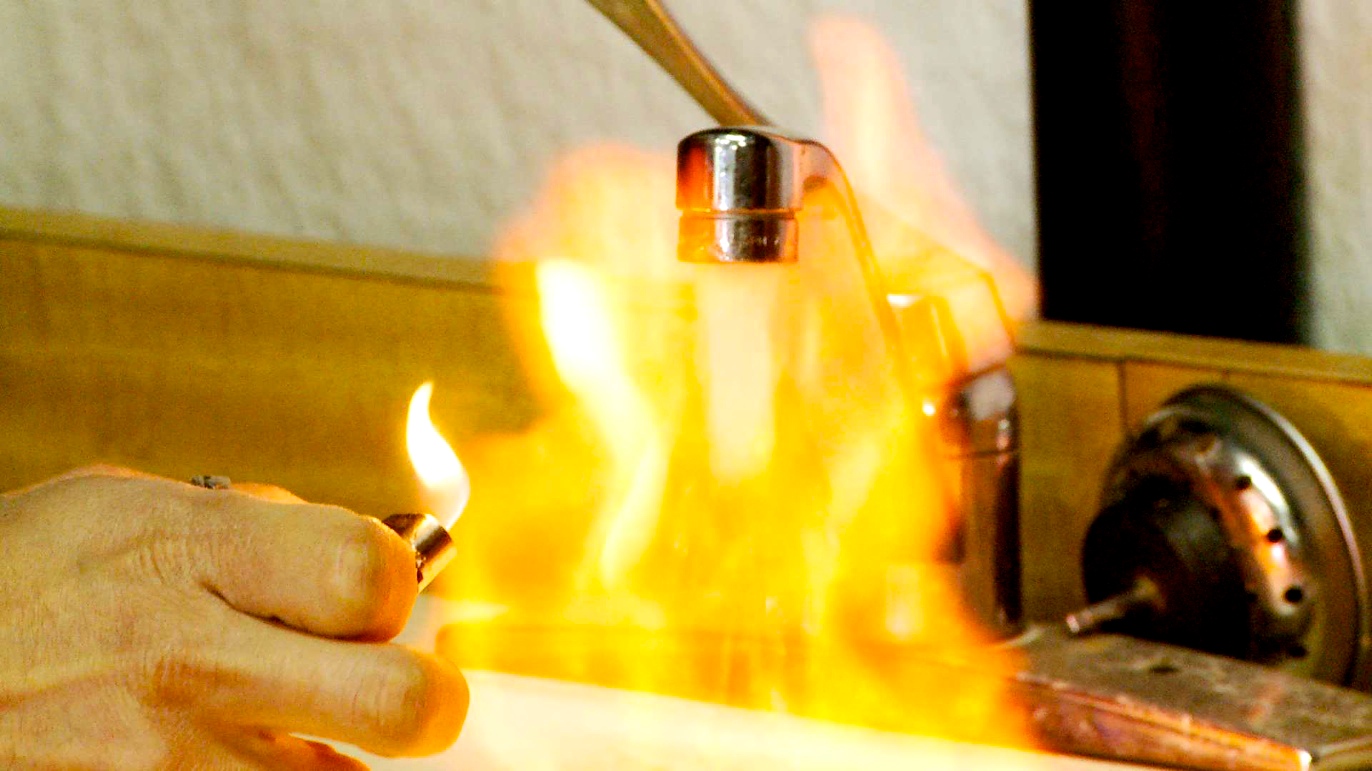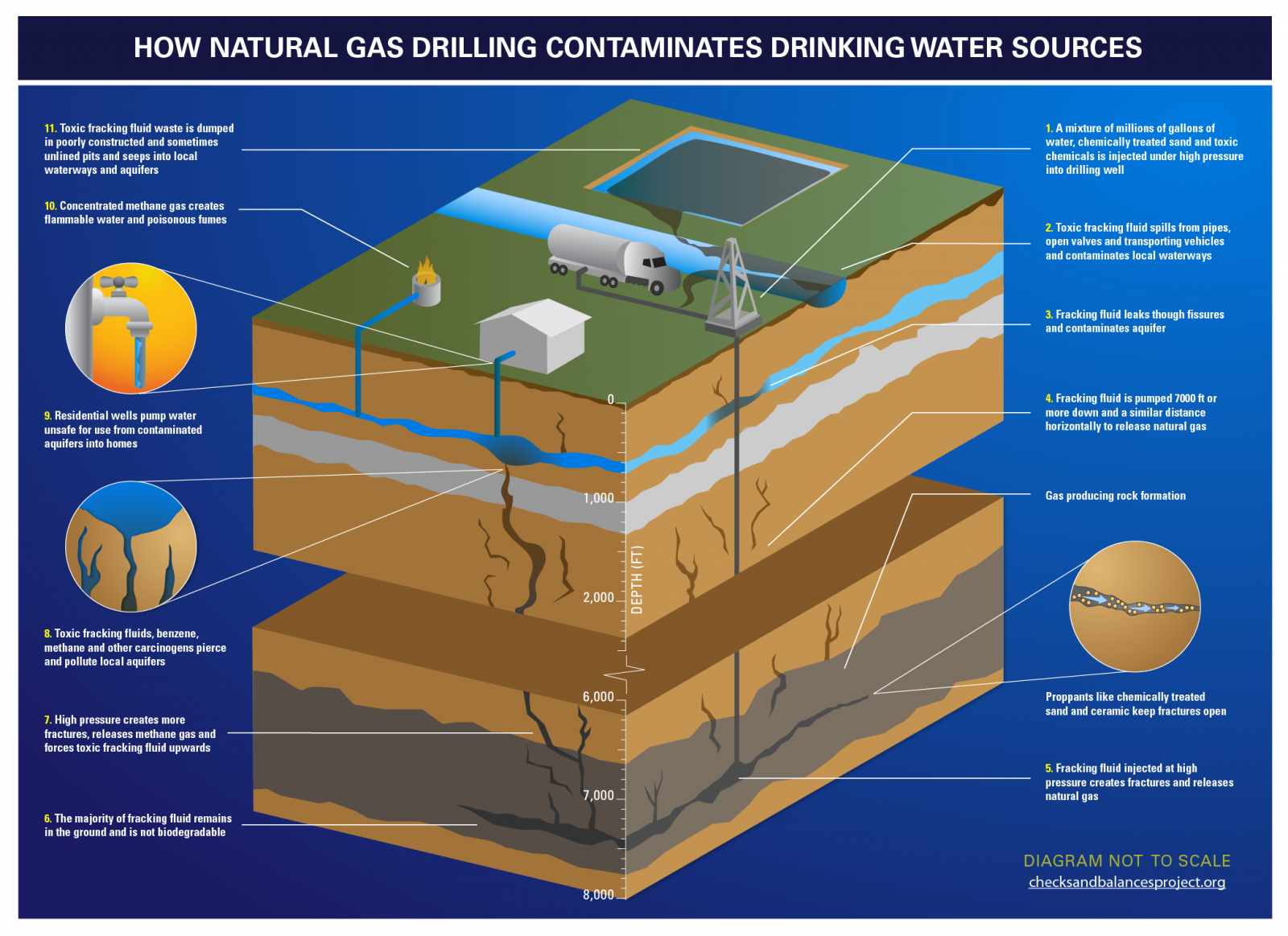
The natural gas boom has led to an “unprecedented industrialization” of many Americans’ backyards, an analysis from the Wall Street Journal has found.
The WSJ looked at census and natural gas well data from more than 700 counties in 11 major natural-gas producing states, and found that at least 15.3 million Americans have a natural gas well within one mile of their home that has been drilled since 2000. That’s more than the population of Michigan or New York.
The boom has left some towns inundated with natural gas operations. In suburban Johnson County, Texas, 99.5 percent of the area’s 150,000 residents now live within a mile of the county’s 3,900 wells — in 2000, there were fewer than 20 oil and gas wells.
And the construction of natural gas wells isn’t letting up anytime soon. Production of the Marcellus Shale region is growing faster than expected, reaching 12 billion cubic feet a day — enough that, if it were a country, the Marcellus Shale would be the eighth-largest producer of natural gas in the world.
America will have “a million new oil and gas wells drilled over the next few decades,” a Duke professor told the WSJ. And it’s likely many of those wells could end up in Americans’ backyards — a recent Reuters analysis uncovered the unsettling trend of home developers keeping the rights to oil and gas reserves under the houses they sell, in many cases without notifying the homes’ buyers outright. That way, the home developer can lease the land of an entire neighborhood to a natural gas company — with or without the residents’ consent.
This boom of backyard wells, however, has driven many Americans to action. More and more cities are voting to ban fracking; Pittsburgh was the first municipality in 2010 to ban the practice, and since then Highland Park, N.J., and multiple cities in Pennsylvania have banned fracking. In 2011, Dryden, N.Y. banned fracking after a fierce and successful lobbying effort from town citizens. Now, that ban is being taken to New York’s highest court, and the court’s decision could set precedent for the legality of other local fracking bans.
It’s not surprising that many towns and cities are concerned about the dangers of fracking. Fracking has been tied to a range of health effects in people and livestock, and it also greatly increases truck traffic around wellsites, leading to an increase of noise and fumes.
It’s largely up to states to enact their own regulations on fracking, and several are — California is requiring oil and gas companies to list the chemicals they use in fracking online and monitor the air and water quality around well sites, and New York state enacted a moratorium on fracking six years ago, in order to give the state time to determine the potential environmental and health impacts of the practice.
But right now, there are few federal regulations on the practice, something House Democrats want to change. They’re calling on the Obama administration to speed up Environmental Protection Agency guidance on fracking — guidance which they say is long overdue.
MEANWHILE, in background reported by Steve Breyman for the Green Shadow Cabinet:
High-volume hydraulic fracturing (better known as “fracking”), the process by which more and more oil and gas in the United States is produced, is good at some near-term things. It’s brought down natural gas prices for consumers. It’s resulted in several boom-towns across America’s shale formations. It’s brought back to life old wells uneconomical to pump through other means. It’s generated significant funds for gas companies and some lucky leaseholders. It’s created thousands of jobs. It’s plowed much needed tax revenues into a few state and local government coffers.
But that’s the problem—fracking is all about now. Fracking is the latest example of short-term political-economic thinking: boom and bust, get-rich-quick. It’s the present moment’s version of the same-old same-old extractive, penetrative, violent resource exploitation model that’s reigned for most of U.S. history. The same model that has us prop up the Saudi royal family, regularly foul our oceans, coastlines and rivers, clear cut forests, carve years off the lives of millions from dirty air, blow the tops off of mountains, spend several hundreds of billions annually on sea lane protection and ‘stabilization operations,’ and load the atmosphere with carbon.
Natural gas is hardly “the bridge [fuel] to the future,” as described by the Obama administration and other proponents. Its current abundance and relative affordability—barring full-cost accounting—postpones the transition to a green energy future. Fracking for gas fragments forests, poisons nearby air and the people who breathe it, threatens scarce fresh water aquifers, crowds rural roads with particulate spewing trucks, and spreads STDs, among other predictable delights.
Fracked gas corrupts state legislators and the Environmental Protection Agency (which does its darnedest to cover up fracking’s effects on ecosystem and human health). It leads to calls for LNG export facilities. Fracking unfairly competes with wind and solar to generate electricity (because, among other reasons, the practice is exempt from the several federal environmental laws which would restrict or make it illegal).
Fracking requires a giant network of new pipelines and compressor stations, results in an extraordinary volume of toxic and sometimes radioactive waste water (sure to come back to haunt us no matter how deeply we inject it into the earth), stimulates earthquakes in the most unlikely of places, and divides communities.
Fracking corrupts scientists (and their university-housed minions) on gas company payrolls, tempts corporate-affiliated national environmental groups to back it, justifies cowardly “all of the above” energy policies, and stunts non-fossil fuel research and development. Fracking in Texas’ Barnett Shale—in the midst of a drought of biblical proportions—has several towns literally running out of water.
Fracking for oil in North Dakota leads to the flaring of natural gas, a gross waste and major cause of disintegrating air quality. Fracking in floodplains brings us the spectacle of drowned wells and untold toxic chemicals on the loose in Colorado after three months of rain fell in twenty-four hours (an extreme weather event made more likely by burning natural gas and other dead dinosaurs).
Fracking is inherently sneaky and dishonest. Land men work their magic to swindle country folk out of a fair return for their mineral rights, and make it very difficult to ever get out of a contract (even after its expiration). Oil companies secretly frack for oil in the Santa Barbara Channel (location of the infamous 1969 spill), hiding the activity from regulators and the public. Fracking firms refuse to divulge the full contents of the frightening cocktail known as frack fluid.
No one (including the U.S. Geological Survey) can say with a high degree of certainty how much gas actually lies buried in one-time biomass, subject to sedimentation, volcanic activity and pressure of hundreds of millions of years. Gas companies spoil drinking water wells then force victims to sign confidentiality agreements as part of settlements (enabling the firms to continue to lie about their records).
Emergency room physicians in Pennsylvania are barred from explaining to patients that fracking was the likely culprit for their acute or chronic ailments. Fracking is so seductive that even California—laboratory for nearly every good energy and environmental policy of the past half century—is unable to pass legislation that ensures environmental health.
Fracking is not, however, inevitable or unbeatable.
The fierce and growing resistance in New York to pumping millions of gallons of water, sand and chemicals under extraordinary pressure thousands of feet below the surface has stayed the hand of a governor (with presidential aspirations) otherwise eager to say yes. A recent poll in New York found opposition to fracking at a historic high.
Earth First!ers stage tree sits to stymie further destruction in the Keystone State. The University of Tennessee failed to solicit a single bid for the right to plunder its thousands of acres of forest. Smart investors are selling leases and otherwise getting out before the inevitable bust. Fracking has likely already peaked. Intensified public pressure on elected and appointed officials must make sure of that.
3 WAYS TO SHOW YOUR SUPPORT
- Log in to post comments













